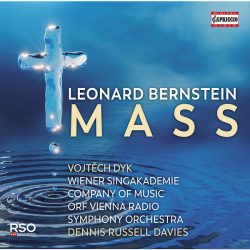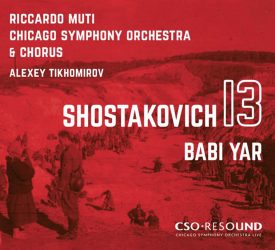Classical CD Reviews: Luciano Berio’s Coro, Leonard Bernstein’s “Mass,” and Shostakovich’s “Babi Yar”
By Jonathan Blumhofer
The relative infrequency of big Berio releases makes new recordings of his major works into significant, contemporary music events; Dennis Russell Davies’s new recording of Bernstein’s Mass is done in by lax vocals and a paucity of emotional consistency; Riccardo Muti and the Chicago Symphony Orchestra supply a great Shostakovich Thirteenth Symphony.

Luciano Berio’s a composer who, generally speaking, has been better served in recordings than in orchestral performances. Given the sheer complexity of nearly all of his music, perhaps that’s unsurprising. Even so, the relative infrequency of big Berio releases makes new recordings of his major works into significant, contemporary music events. Such is the situation with the Norwegian Soloists’ Choir’s (NSC) new pairing of Coro and Cries of London on Bis.
The former’s been the recipient of a couple of fine recordings already — one led by the composer, another by Pierre Boulez. What this effort has going for it is a clarity of texture that’s married to breathtaking technical precision. The result is a reading, led by Grete Pedersen and also featuring the Norwegian Radio Orchestra, of uncommon lyricism and color.
Subtleties of Berio’s scoring — like the dovetailing and doubling of voices in the opening “Today is mine” — pop. The NSC’s accounts of the music’s gestural effects, particularly its bent notes and arrays of clusters, conjure a range of chimerical soundscapes, from lush to terrifying.
Rhythmically, the combined ensembles’ contributions are taut and precise. At the same time, Coro’s moments of stasis (like the haunting “Mirad mi casa muerta”) never lack for intensity or focus.
Balances between voices and instruments are generally fine — the pseudo-aria “Pousse l’herbe et fleuret la fleur” features beautifully matched tenor and horn solos — though, at some of the piece’s biggest moments, the orchestra covers the choir a bit.
Rounding out the disc is the 1973-74 Cries, which sets various vendors’ calls (“Garlic, good garlic,” “Money, penny come to me,” and the like) in dense counterpoint. As in Coro, the NSC sings with excellent diction, rhythmic and tonal precision, and, here, a good feel for the music’s underlying whimsy.
Musically, then, these aren’t the year’s easiest offerings. But they’re brilliantly sung (and played) and, on the whole, finely engineered.

As a score, Leonard Bernstein’s Mass has aged rather well. Dismissed by some critics at as passé at its 1971 premiere, this “theater piece,” with its (to some, sacrilegious) questioning of the place of faith — Christian or other — in the modern world and mélange of musical styles today comes over as timely and prescient.
Over the years, it’s been pretty well served on disc. Bernstein’s own original-cast recording, anchored by Alan Titus’s magnificent Celebrant, remains definitive, followed closely by Marin Alsop’s 2008 account (which cleans up some of the piece’s dumber lyrics and also boasts a fine lead in Jubilant Sykes).
Alas, Dennis Russell Davies’s new recording of Mass with the ORF Vienna Radio Symphony Orchestra doesn’t rise to the level of either Bernstein’s or Alsop’s.
That’s not for lack of effort. In fact, Davies has got a fantastic orchestra in the ORF ensemble, which takes to Bernstein’s flamboyant, extroverted orchestral writing with élan. They’ve got his style in their veins: “Prefatory Prayers” snaps, the three orchestral “Meditations” surge (the “De profundis” proves particularly weighty), and the writing for electronic and percussion instruments rarely fails to impress for either depth or color, be that in the “Confiteor” or “Gospel Sermon” (the rhythm section in the latter is terrific).
So, what’s wrong here? In a word, it’s the vocal performances.
Vojtech Dyk’s Celebrant, for instance, doesn’t lack for color or agility (he throws in some nice little embellishments in “A Simple Song,” for instance). Yet his performance either falls victim to poor engineering — say, sounding too far back in the mix to exert a meaningful presence — or, by comparison to Titus or Sykes, a want of energy and focus. The latter two, for instance, inhabit the decisive “Fraction” with a ferocity that’s simply gripping. Here, that movement passes with a shrug.
Similarly, other solo numbers, like the first set of tropes (“I Don’t Know” and “Easy”), feel hesitant and reined in. The irreverent “Gospel Sermon” never finds a firm stylistic or rhythmic footing (the “goddam good” refrains need much stronger emphasis). Ditto for the patchy solo in “I believe in God” and “You said you’d come again.”
As for the ensemble numbers, the “Thrice-Triple Canon” and “In nomine Patris” near Mass’s beginning lack for rhythmic spark. So — sadly — do Paul Simon’s “Half of the People” (orchestrally suave but vocally flabby) and the “Sanctus,” which, contrary to Bernstein’s own reading, is here weirdly turgid. The climax of “World Without End” is likewise distended. So is the climactic “Agnus Dei,” which requires a more uniform bite from singers and instrumentalists; it never locks in here as it does in Bernstein’s (or Alsop’s) performances. One could go on, but you get the point.
So, at the end of the day, I wish I had more good things to say about this album. Surely, Mass is one of the late 20th-century’s most provocative and thought-provoking pieces (not to mention one of its most haunting). Davies’s efforts — some lethargic tempos notwithstanding — are laudable and, at least instrumentally, he matches (or exceeds) much of what came before.
But ultimately, this Mass is done in by lax vocals and a paucity of emotional consistency. Would this wasn’t the case; yet it is.

Riccardo Muti might not be a conductor you immediately associate with the music of Dmitri Shostakovich. Yet, he’s got some history with it: in 1970, Muti led the Western European premiere of Shostakovich’s Symphony no. 13, “Babi Yar.” In 2018 he returned to the piece with the Chicago Symphony Orchestra (CSO) – and Shostakovich’s widow, Irina, in the audience.
The recording drawn from those concerts on the Orchestra’s in-house label, CSO Resound, definitely offers a distinctive, compelling approach to the piece. Nothing is rushed; in fact, Muti’s tempos are almost surprisingly broad (the whole performance clocks in at nearly 70 minutes, a good 10 or so over the average). Yet, the expressive effect of his reading is nothing less than compelling. Tension and intensity never flag.
Bass Alexey Tikhomirov and the CSO Chorus bring resonant tone and rhythmic bite to their contributions.
Tikhomirov’s solos in the title poem and “At the Store” are dark-hued, while “Humor” is biting and sardonic. Meanwhile, the Chorus snaps and snarls in its numerous appearances, potently blending with the soloist in the symphony’s crowning moments.
Throughout, the CSO’s contributions are striking for their rhythmic precision and tonal heft as well as sense of character and emotional rightness; the low brass playing in “Fears” is particularly menacing. The lilting refrain of the finale sings with what might best be described as a kind of sinister innocence.
In a word, then, this a great Shostakovich Thirteenth Symphony. Muti’s vision of the piece is uncompromising in its sincerity and direction. The performances are equally immediate. Yevtushenko’s poem remains potent and auspicious as ever. And Shostakovich’s score, particularly in these hands, speaks with uncommon urgency. While the year may be young, this is already one of 2020’s finest recordings.
Jonathan Blumhofer is a composer and violist who has been active in the greater Boston area since 2004. His music has received numerous awards and been performed by various ensembles, including the American Composers Orchestra, Kiev Philharmonic, Camerata Chicago, Xanthos Ensemble, and Juventas New Music Group. Since receiving his doctorate from Boston University in 2010, Jon has taught at Clark University, Worcester Polytechnic Institute, and online for the University of Phoenix, in addition to writing music criticism for the Worcester Telegram & Gazette.
Tagged: Bis, CSO Resound, Capriccio, Dennis Russell Davies
